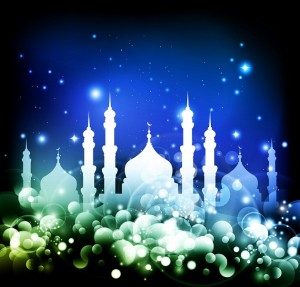 The Islamic New Year, commonly referred to as Al-Hijra or Muharram is a great time for an interfaith minister to share the enriching traditions of this annual observance with church members.
The Islamic New Year, commonly referred to as Al-Hijra or Muharram is a great time for an interfaith minister to share the enriching traditions of this annual observance with church members.
The emergence the new moon ushers in the Islamic New Year. The Universal Life Church respects and reveres the turning of the year according to the crescent moon as it is understand by the Islamic tradition. It can be an enchanting experience to use a sermon to transport church members to a time of old, when faith and belief inspired cultural practices that have traveled through the ages up until present day. Not many people are familiar with the significance of the Islamic New Year. It was the year 622 AD when the very first Islamic year was etched into history. This marked the prophet Muhammad’s travels from Mecca to Medina.
Unlike the festival-like celebrations used to commemorate the new year of the Gregorian calendar throughout the world, the Islamic New Year brings with it commemoration of a more subdued, slightly somber, note. Attention is turned inwards mourning. In particular the mourning of the martyrdom of Hussein ibn Ali, a grandson of the prophet Muhammad who was slain in battle. To mark the start of another year, it is quite common for people to take to the streets in procession, whether on foot or on the backs of camels. Using this period of mourning and the change of a new year is a wonderful opportunity for an interfaith minister to encourage reflection and growth within his own congregation. A period of societal mourning offers church members a time to discern over loved ones and events in their own life which require a grieving process. It is a time of spiritual refreshment and a time for marking new beginnings.
The first month of the year has particular spiritual significance to Muslims since it is mentioned in the Quran as being a sacred month. Because of discrepancies between the Islamic year and the Gregorian calendar which make the Islamic calendar eleven or twelve days shorter, it is not possible for the event to fall on the same date every year in the West. As is customary in Islamic holidays, the New Year is technically observed beginning at sundown the night before. This means that 2013’s start will begin at November 14th at sundown.
One need not be a follower of Islam to appreciate the deeply historical importance of the Islamic New Year. In fact, the observation of Muharram was enacted by Muhammad following his observance of the fasting practices of Jews. When Muhammad inquired as to why they were fasting, he was told that is was in honor of Moses. Muhammad promptly declared that Islam would hold a special honor for Moses, seeing that a fast lasting two days, called Muharram, would become a tenant of Islam. To this day, Muslims all around the world commit themselves to two days of fasting at the start of the new year. This fusion of faiths makes observing Muharram a point of common ground between many world religions. One of the best reasons to be ordained an interfaith minister at Universal Life Church is that you are encouraged to spread positivity and knowledge about the many culturally rich practices of the world’s great religions. To be ordained is to be a conductor of knowledge and awe in the spiritual expressions of religions all across the world.

